Senior College Course Guide
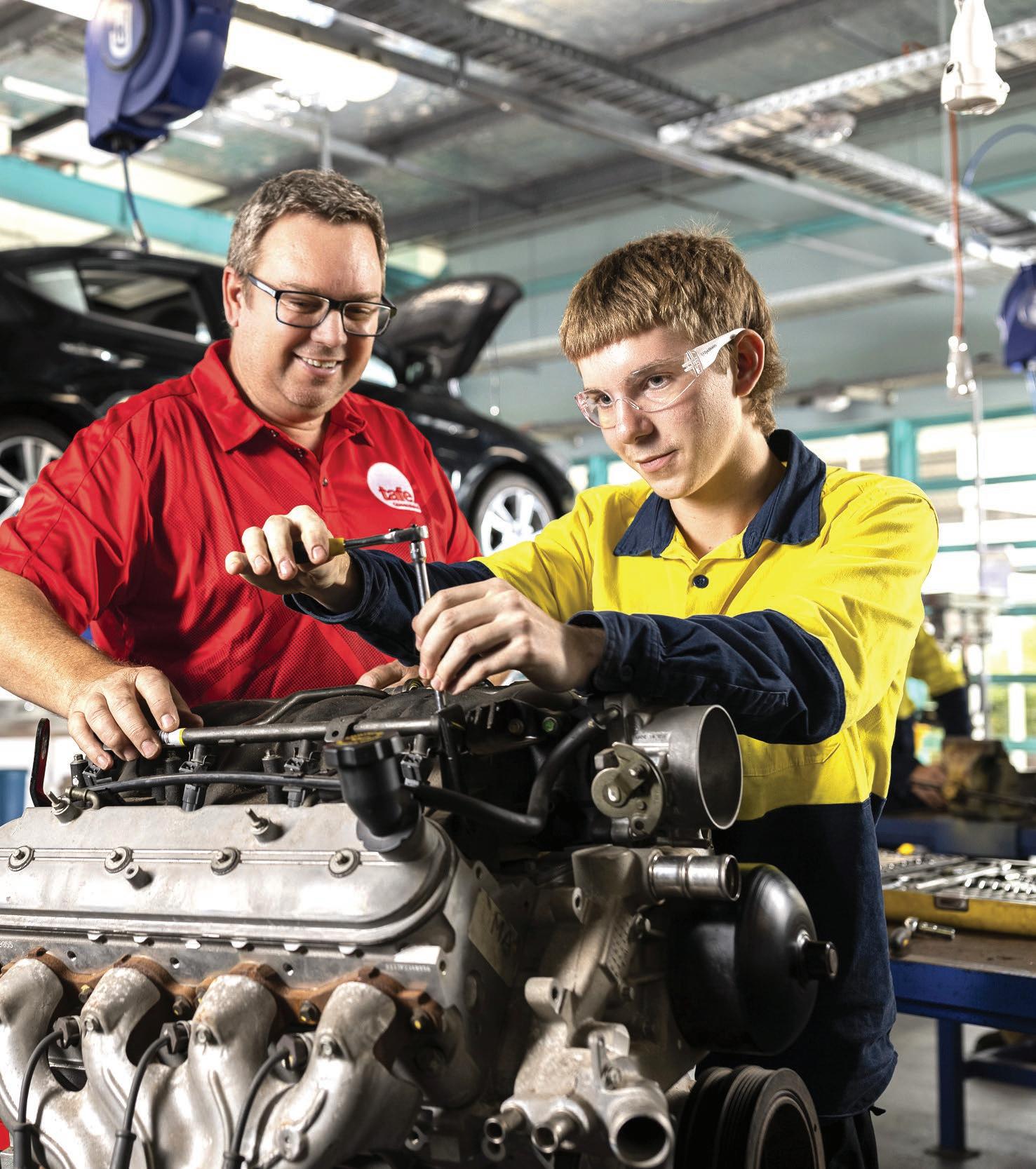




Welcome to TAFE Queensland, the largest and most trusted training provider in the state. For over 140 years, we have had the privilege of helping our students change their lives, achieve their career aspirations, and make great happen.
TAFE Queensland’s Senior College program is an inclusive learning environment that celebrates young people and provides them with a supportive educational pathway. Our school allows students to achieve socially and academically, developing tailored learning plans to meet their unique needs.
Senior College is part of our local community. We embrace diversity, make it visible as a strength, and support respectful relationships within the school community and between students and teachers. We welcome all students to our school by providing a holistic approach so that our students and families feel welcome, respected, included, and safe. We ensure students have the right educational pathway for them and develop the necessary skills to move forward into adulthood.
Welcome again. We cannot wait to see how you define your greatness.
Mark Jenkins Head of Senior College Senior College and Community Pathways
TAFE Queensland
The learning environment at our Alexandra Hills campus enables Year 11 and 12 students to develop as individuals in a friendly and supportive atmosphere - with no school uniforms!
Students have access to:
• industry-standard vocational training facilities
• TAFE Queensland library services
• theatre and auditorium
• computer labs
• maritime facilities at Wellington Point Jetty.
Our students benefit from a flexible curriculum tailored specifically to their goals. Students complete their QCE and, if they choose, work towards an ATAR. Our program encourages students to be independent and take responsibility for their course of study, with reasonable adjustments organised where required.
• With classes four days a week, students can study a vocational certificate or school-based apprenticeship while finishing school.
• Year 12 students will also join the Career Hub in Semester One of their Mentor Program, preparing them for the completion of Year 12 and equipping them with critical job-ready skills.
• Students will focus on career pathways and hear from an exciting schedule of industry guest speakers to discuss career choices.
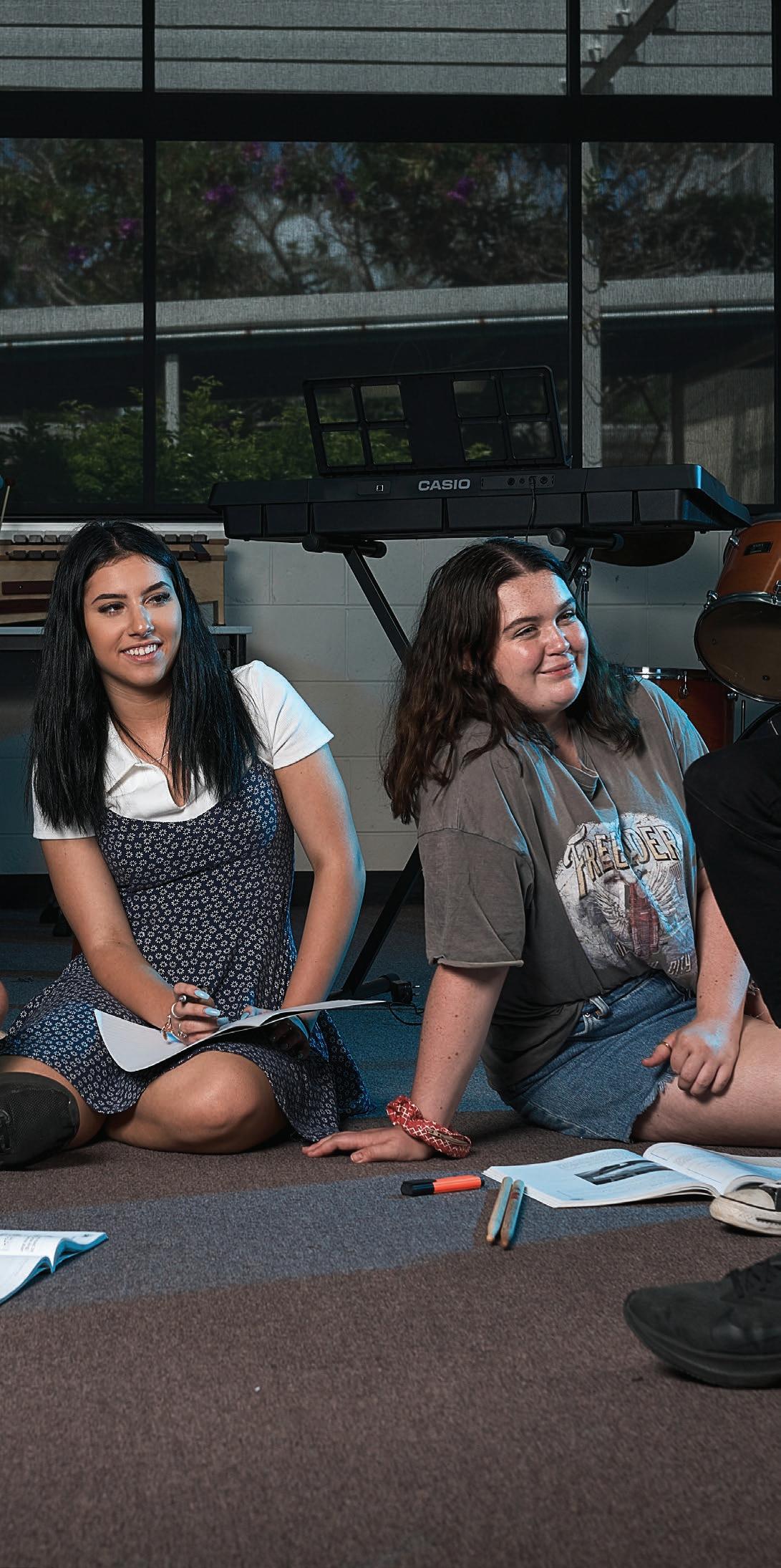

We have a supportive community with access to dedicated teachers and resources, ensuring an inclusive and encouraging learning experience.
TAFE Queensland offers a holistic range of student support services, including:
• qualified counsellors
• career guidance with counsellors
• tutorial support
• mentor program
• career hub
• student events
• AccessAbility Support Officers.
• All Senior College students are enrolled in our Mentor Program, which is designed to prepare them for the challenges of study, regardless of their initial academic ability.
• This program is embedded in the Social and Community Studies subject, allowing students to develop essential life skills while gaining four (4) credits towards their QCE upon successful completion.
• The Mentor Program comprises various activities, discussions, and guest speakers, supporting students throughout their time with us and enabling them to set and achieve their goals for the future.
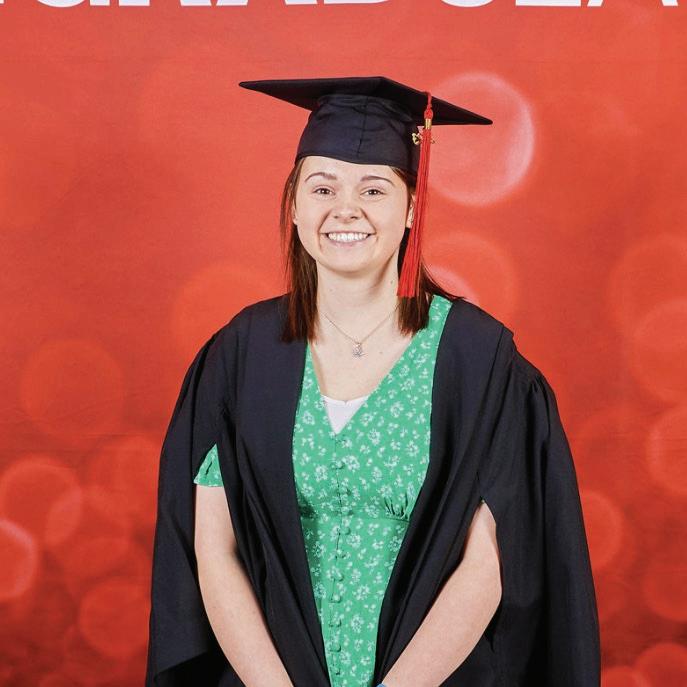
Senior College was more than a school; it was a community that helped me discover my potential and equipped me with both the skills and the confidence to pursue my dreams and make a difference.”
Emily
Senior College graduate Diploma of Justice Studies 10972NAT
When Emily enrolled in TAFE Queensland Senior College, she never imagined graduating with a newfound confidence, a diploma, and an ambitious justice career path.
Now a Diploma of Justice Studies (10972NAT) graduate, Emily is on the path to joining the Queensland Police Service, a dream sparked and nurtured by her experiences and teachers at Senior College.
Reflecting on her time at Senior College, Emily credits her former teachers for their unwavering support and encouragement at the high school.
EMILY’S PATHWAY
Senior College
Diploma of Justice Studies (10972NAT) Police Officer
TAFE Queensland has a range of pathway options that can get you started on your university degree sooner. Open up pathways to a degree and keep your options open with a certificate, diploma, bridging course, or tertiary preparation program. With TAFE Queensland, there’s more than one way to achieve your higher education dreams.
Employment ready
IV in
Senior College
Years 10, 11 or 12 qualifications
Unilearn
There’s more than one way to get into your dream university degree. TAFE Queensland has a range of pathway options and partners that can get you started on your university degree sooner.
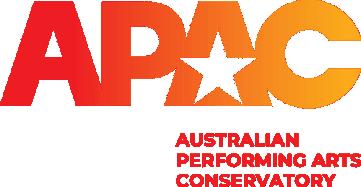



16 SEPTEMBER 4.30PM-6.30PM

We build individualised study programs for each student that give them the flexibility to complete their high school studies and go to their apprenticeship, work, or attend further studies. It’s a fantastic program that changes our students’ lives.”
Director, Senior College and Community Pathways
TAFE Queensland
All applicants must be between 15 and 17 years of age at the time of application, have completed Year 10 or equivalent, and have achieved five (5) Year 10 subjects, including English and Mathematics. Each application is assessed on merit during the enrolment interview.
Enrolment information and application forms are available at tafeqld.edu.au/ seniorcollege.
We are here to help! You can talk to our team by:
• calling us on (07) 3826 8407
• LiveChat on our website
• submitting an enquiry form on our website.
Once we receive your application, we will contact you to discuss the next steps in your enrolment process.
1. Contact our team or apply through the website
2. Book an enrolment interview
3. Complete your enrolment pack
4. Attend Orientation
5. Commence study

Study Senior College at TAFE Queensland. It’s the best possible thing you can do for yourself.”
Violet
Senior College graduate Certificate II in Automotive Vocational Preparation AUR20720
The Queensland Curriculum and Assessment Authority (QCAA) is a statutory body of the Queensland Government that provides Kindergarten to Year 12 syllabuses, guidelines, assessment, reporting, testing, and certification services for Queensland schools. All subjects taught in our Senior College program are QCAA accredited to the same standards as other Queensland high schools.
Eligible Queensland students graduating Year 12 will receive an ATAR. This ranking, between 0 and 99.95, will be used to assess applications for tertiary entrance into courses offered by TAFE Queensland and other higher education providers.
To be eligible for an ATAR*, the successful completion of five (5) subjects (C or better) is required, with a minimum of four (4) being general subjects.
A student’s ATAR will be calculated from their best five (5) subject results, one of which may be:
• a Vocation Education and Training (VET) certificate III or above, or
• an applied subject result.
For more information on ATAR, please visit the QTAC website: qtac.edu.au/atar
The SAT program is a government-funded school-based apprenticeship or traineeship where students can commence a nationally recognised training program as an employee while completing their QCE. A training agreement is individually designed in consultation with the student, the employer, the Vocational Trainer, an Australian Apprenticeship Centre, and the school.
TAFE Queensland Senior College students are able to pursue a SAT program of their choice whilst completing their studies.
A student taking on a SAT program will:
• study three (3) to five (5) QCAA subjects and undertake the Mentor Program
• work part-time
• undertake vocational training connected to that particular work area.
The QCE is Queensland’s senior school qualification awarded to eligible students, usually at the end of Year 12.
The QCE is a broad-based, internationally recognised qualification awarded to young people who have achieved a significant amount of learning (to a set standard and in a set pattern) while meeting literacy and numeracy requirements.
The QCE is a student’s passport to move confidently from school to work, training and further education. It is awarded to students who achieve 20 credits across a wide range of learning options, including general and applied subjects, vocational education and training, and workplace or community learning.
General subjects are based on syllabuses approved and issued by the QCAA. Results in general subjects can count in the calculation of an ATAR, the most common selection device used by the tertiary sector.
In general subjects, senior students’ learning will be assessed using four (4) assessment tasks. The classroom teacher will conduct three assessment tasks, with the final task being a subject-specific state-wide external task or exam.
Applied subjects are developed from the Subject Area Syllabuses (SAS) and, when successfully completed, contribute four (4) credits toward a QCE. One (1) applied subject may also contribute towards the calculation of an ATAR for tertiary entrance.
For more information, visit: qcaa.qld.edu.au/senior
* Successful completion of an English subject (C or better) is necessary to be eligible for an ATAR; however, this grade will only be used in the calculation if it is one of the student’s best five subject results.
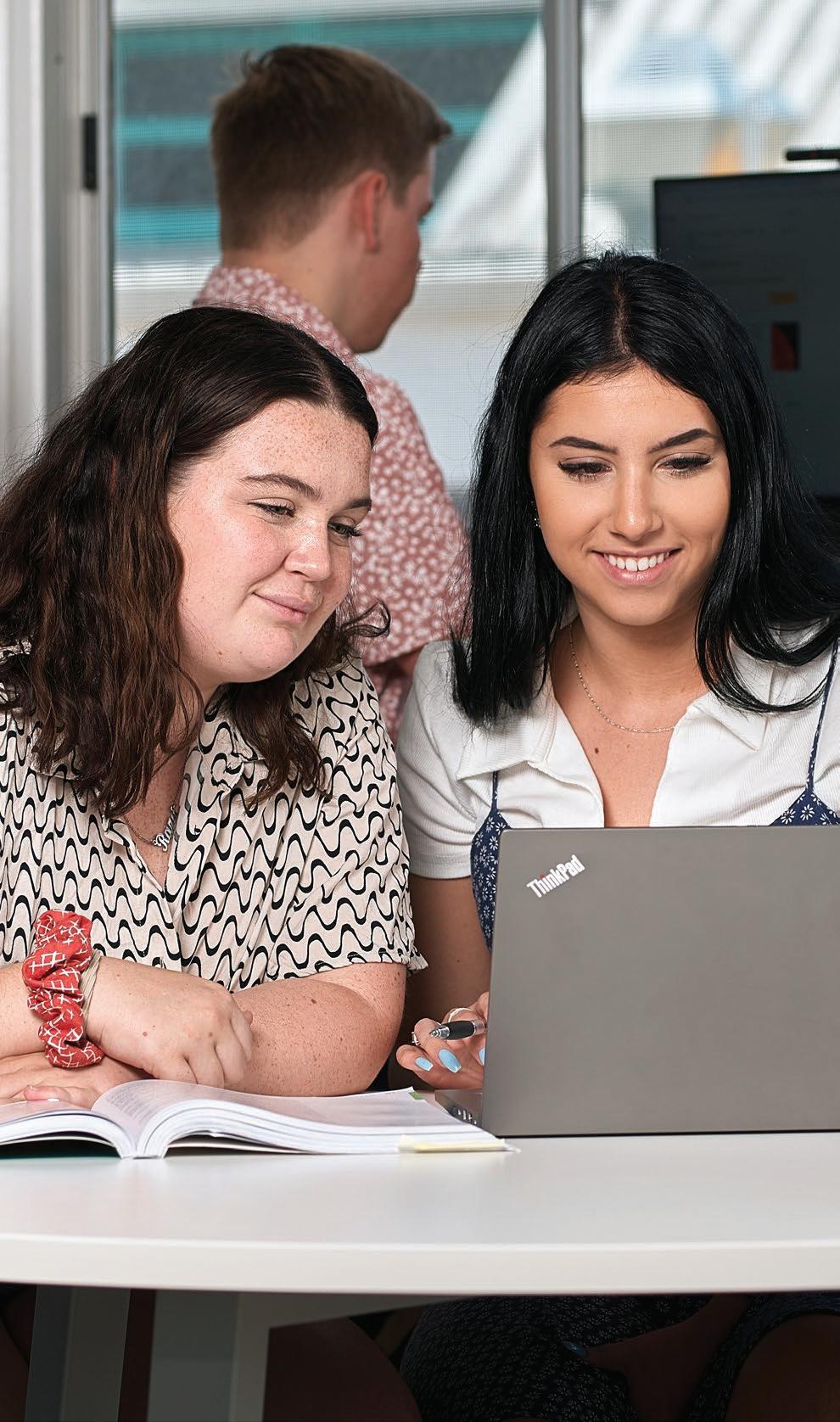
If you are considering further study, you need to check with the provider to ensure you are studying the required prerequisites for their course.
A Queensland Tertiary Admissions Centre (QTAC) guide will be available at our interview to check current Queensland prerequisites.
Mentor Program
SIX (6) GENERAL SUBJECTS OR FOUR (4) GENERAL SUBJECTS + TWO (2) APPLIED SUBJECTS OR A
COMPLETED CERTIFICATE III OR HIGHER
What’s involved
• Two (2) compulsory general subjects (English, General Mathematics)
• Social and Community Studies (applied subject)
• Two (2) additional general subjects
• One (1) applied subject or vocational certification + + +
Leads to
• QCE
• ATAR
• Employment
• Entrance to a TAFE Queensland diploma/university degree
• ATAR
• Queensland Certificate of Education
• Vocational qualification (if undertaken)

Various vocational certificates are available through the TAFE at School program for Senior College students. Eligible students can enrol in priority VET pathway courses under the new Career Ready program, including certificate I and II qualifications, school-based apprenticeships, and traineeships. Additionally, there are full-fee courses ranging from certificate III to diploma and degree foundation courses.
The full range of TAFE at School courses is available at the back of this guide.
Mentor Program
FIVE (5) QCAA SUBJECTS + ONE (1) VOCATIONAL CERTIFICATE OR
SIX (6) QCAA SUBJECTS
What’s involved
• Three (3) compulsory QCAA-registered subjects (Social and Community Studies, Essential English, and Essential Mathematics)
• Two (2) additional QCAA-registered subject and one vocational certificate or
• Three (3) additional QCAA-registered subjects
To complete, students need to have accumulated 20 points, at least 12 credits must be core +
Leads to
• QCE
• Vocational certificate(s)
• Employment
• TAFE Queensland diploma courses and ongoing study options
• Queensland Certificate of Education
• Vocational qualification (if undertaken)

APPLIED PATHWAY SUBJECTS
Aquatic Practices
Business Studies
Drama in Practice
Essential English
Essential Mathematics
Information and Communication
Technology
Music in Practice
Science in Practice
Social and Community Studies +
Visual Arts in Practice
Vocational Certificate*
Please note that students who wish to apply for an alternative university ranking must complete a certificate III or higher over the course of their studies. *
GENERAL PATHWAY SUBJECTS
Biology
Business
English
General Mathematics
Health
Mathematical Methods
Psychology
Social and Community Studies
KEY LEGEND
+ ATAR and QCE pathway
QCE and/or vocational pathway
QCE and/or vocational pathway required
Applied subject
Aquatic Practices is a practical subject that develops nautical knowledge and skills in a real-life marine environment. Students will gain practical experience while engaging in safe and responsible practices. This subject is delivered on campus and at our maritime facility at the Wellington Point Boat Shed and Jetty.
Subject at a glance
By studying Biology, you will learn about the complex and diverse world of organisms and the natural systems that affect them. You will get the chance to undertake experiments that investigate problems pertaining to the living world, including plant and animal physiology, genetics and ecology.
General business is a dynamic subject that looks at the rapidly changing, technology-focused, and innovation-driven world. It will build students’ confidence and capacity to engage as members or leaders in the workforce due to their ability to understand the inner workings of the business world. Students can expect to be challenged academically and develop their higher-order thinking skills and entrepreneurial mindset through exposure to a wide range of authentic case studies where they will deep dive into solving the challenges they may face.
• Water safety and maritime working practices
• Weather and tides
• Vessel types, construction, and applications
• Vessel skippering
• Coastal navigation
• Aquatic ecosystems of Moreton Bay
• Essential skills for safety on the water across a variety of craft, from human-powered to steam to sail
• Maritime laws and regulations
• Considerations when purchasing a vessel
• Chart reading, course plotting, and trip planning
• Testing and analysis of local ecosystem health
• Cellular biology
• Animal and plant physiology
• Genetics and diversity
• Ecological studies
• Contemporary global issues in science
• Developments in biology and their impact on modern society
• The link between biology, technology, and economic development
• Basic anatomy and physiology of plants, animals, and microbes
• Fundamentals of business
• Business start-ups
• Feasibility of business ideas
• Competitive markets
• Hostile competitive markets
• Evolution and transformation of mature businesses
• Strategic planning throughout the business life cycle
• In complex business environments, analysing data and information to identify any relevant relationships and trends
• Skills required to make evaluations, draw conclusions and provide recommendations for business problems
• The importance of teamwork, working collaboratively, and developing social skills
Subject at a glance
Once enrolled in Business Studies, you will be involved in a range of contemporary real-world activities. Business learning involves a range of experiences that provide knowledge, processes, and skills that can be applied to business in the real world. You will gain an understanding of business environments and have the opportunity to engage in practical business projects.
• Events management
• Marketing
• Entrepreneurship
• Business administration
• Understand the technologies utilised in day-to-day business operations
• Identify how teamwork facilitates innovation and success in business
• Develop communication strategies to sell ideas and build partnerships
Subject at a glance Topics
Drama in Practice allows students to explore, create, and perform drama through planning, directing, interpreting and directing a range of works. Students engage with published scripts and collaborate to develop original performances, building confidence and theatrical skills. While some adjustments can be made, group assessments and recorded performances are a core part of the subject.
glance
English is a two-year subject that is highly recommended if you want to gain an ATAR. To meet entry requirements for most university courses, students must have completed four (4) semesters of senior English. Assessment is predominantly written with some compulsory spoken tasks. You will have opportunities to engage with diverse texts for various audiences and purposes.
• Contemporary theatre – Australian gothic theatre
• Commentary – fairy tale monologues
• Collaboration – realism
• Community theatredocumentary theatre/ verbatim
• Devising, directing, and performing drama practices
• Analyse drama forms and styles, planning works in small groups
• Use of dramatic language and drama games to organise and communicate ideas
• Appraise scripts and performances’ including their own
• Perspectives and texts
• Culture and texts
• Text connections
• Close study of a literacy text
• Exploring, examining, and responding to texts
• Creating imaginative and analytical texts
• Exploring connections between texts
• Engaging with and responding to literary texts
Essential English equips students to think critically about texts, their representation of the world, and human experiences. The framework considers the interplay between language, purpose, context, audience, and meaning, including audience positioning and relationship-building.
• Language and structural choices influence perspectives and create specific effects
• Texts represent ideas, attitudes, and perspectives, and their impact on audiences is influenced by purpose, cultural context, and social situations
• Texts position readers, viewers, and listeners in various ways
Essential Mathematics provides a broad foundation of practical mathematics if you are planning a vocational outcome. This subject is organised into various vocational themes with a focus on numeracy and basic mathematical skills that are encountered in day-to-day living.
• Reading maps, tables and graphs
• Earning, spending, borrowing and investing money
• Taxation and Goods and Services Tax (GST)
• Renting, buying and renovating property
• Business planning
This subject will equip you with the skills to manage day-to-day scenarios that require the use of mathematics. General Mathematics is a QCAA subject that contributes to your ATAR (used to meet the entry criteria for most universities).
• Financial mathematics and investing
• Applied geometry
• Data exploration and analysis
• Sequences networking
• Shapes and scale factors
• Skills to communicate confidently and effectively in a variety of contemporary contexts and social situations
• Explore structure, language, language features and technologies to best convey meaning
• Creative use of imaginative thinking to explore a variety of perspectives
• Using language effectively to communicate meaning, analyse, and deconstruct texts
• Calculations used for basic financial management
• Skills needed to interpret data displayed graphically
• Knowledge required to plan for and solve real-life scenarios
• The knowledge and skills of computation, estimation and measurement
• How to interpret and analyse information presented in a variety of forms
• The ability to make judgments based on evidence and reasoning
• How to justify and communicate results in a variety of forms +
This fascinating subject will allow students to explore the health of individuals and communities, whilst applying recognised health theories and frameworks to real-life situations. Drawing from the health, behavioural, social, and physical sciences, this subject offers students an opportunity to investigate various health issues. Students will design, implement, and evaluate action strategies to combat these issues.
• Resilience – an individual health resource
• Alcohol – using peers and family as a health resource
• Road safety – using the community as a health resource
• Respectful relationships
Information and Communication Technology is a practical subject designed to develop students’ skills using a range of software applications and solve client problems using a variety of communication modes. This subject will contribute to your ability to engage with technology, solve real-world problems, and apply these skills to the workplace.
• Web development
• Video production
• Graphic design
• Digital imaging and modelling
• Factors that affect health
• Health theories and frameworks
• Developing and promoting healthy initiatives +
• Current and emerging hardware and software combinations
• Skills needed to solve client problems, both technical and creative
• Social, environmental, and legal impacts when using digital technologies
• Communicating client solutions by preparing presentations as a business report, attending meetings, and informational videos
Subject at a glance Topics
Mathematical Methods focuses on advanced mathematical concepts like calculus, probability, and statistics, allowing students to apply complex mathematical models to real-world situations, emphasising critical thinking and problem-solving skills through the analysis of functions, graphs, and their derivatives, often considered a stepping stone for further studies in science and engineering fields.
• Surds, algebra, functions and probability
• Calculus and further functions
• Further calculus and an introduction to statistics
• Further calculus, trigonometry and statistics
• Understand and remember key concepts, rules, algorithms and techniques
• Use graphs and symbols to represent mathematical models
• Critically assess the strengths and weaknesses of different mathematical methods
• Logically organise mathematical arguments, using sound reasoning and decision-making
Music in Practice is a hands-on subject where students compose, perform, and engage with music. They will rehearse individually or in small groups, perform for audiences, and create their own compositions.
• The music of today
• The cutting edge
• Building your personal brand
• How to perform live on stage
• The technologies involved in creating and recording musical work
• Developing and refining self-created musical pieces
• Rehearsal and performance skills
The Psychology subject allows students to explore concepts that explain human behaviour and underlying cognitions. Students will consider and examine theories on social psychology, interpersonal processes, attitudes and cross-cultural psychology.
• Examine the role of the brain in individual development, cognitive development, human consciousness, and sleep
• Examine individual thinking and how the brain, including perception, memory, and learning
Subject at a glance
Science in Practice integrates creative and critical thinking, where students apply scientific knowledge and skills to produce practical outcomes. Key features include projects and investigations. Projects involve applying cognitive, technical, and reasoning skills, while investigations follow scientific inquiry methods to deepen understanding of specific topics and their real-world applications.
• Severe ecological disasters
• How to create a self-sustaining ecosystem
• Model sustainable housing builds
• International sustainable housing projects
• Crime scene analysis and forensic science
• Core body/discipline knowledge aspects of the skills used by scientists to develop new knowledge, as well as the opportunity to refine these skills through practical activities
• How to critically evaluate psychological concepts
• How to conduct field research
• Communicate psychological understandings, findings, arguments and conclusions
• Planning and completing scientific projects
• Collecting and analysing primary and secondary data
• Completing the scientific investigation and inquiry process
• Writing reports using scientific language
Social and Community Studies promotes critical, creative and constructive thinking and focuses on personal development, building social skills and respecting cultural diversity. This subject develops communication and interpersonal skills, problem-solving, decision-making, resilience, self-esteem, and self-confidence, all while encouraging responsible attitudes and behaviours. Essential workplace, learning, and study skills are also incorporated.
• Growing and developing as an individual
• Living with and relating to others
• Receiving from and contributing to the community
• Health and nutrition
• Career guidance
• Money management
Visual Arts in Practice empowers students to explore visual language, combining media, technologies, and skills to create experimental and resolved artworks. Students independently select media and utilise visual features to respond to real-world stimuli, expressing their artistic intentions. This subject emphasises practical application and fosters connections with local artists.
• 2D media processes –drawing, painting and printmaking
• Digital media processes
• 3D media processes –ceramics and sculpture
• Visual literacy
• Artwork realisation
• The development of personal, interpersonal and citizenship skills
• Social contexts and issues
• Language conventions and features to communicate ideas and information
• Communicating the outcomes of social investigations
• Appraise inquiry processes and the outcomes of social investigations
• How to seek creative solutions to design problems
• How to apply critical thinking to meet deadlines
• How to demonstrate creative and technical skills
• Relevant workplace health and safety practices
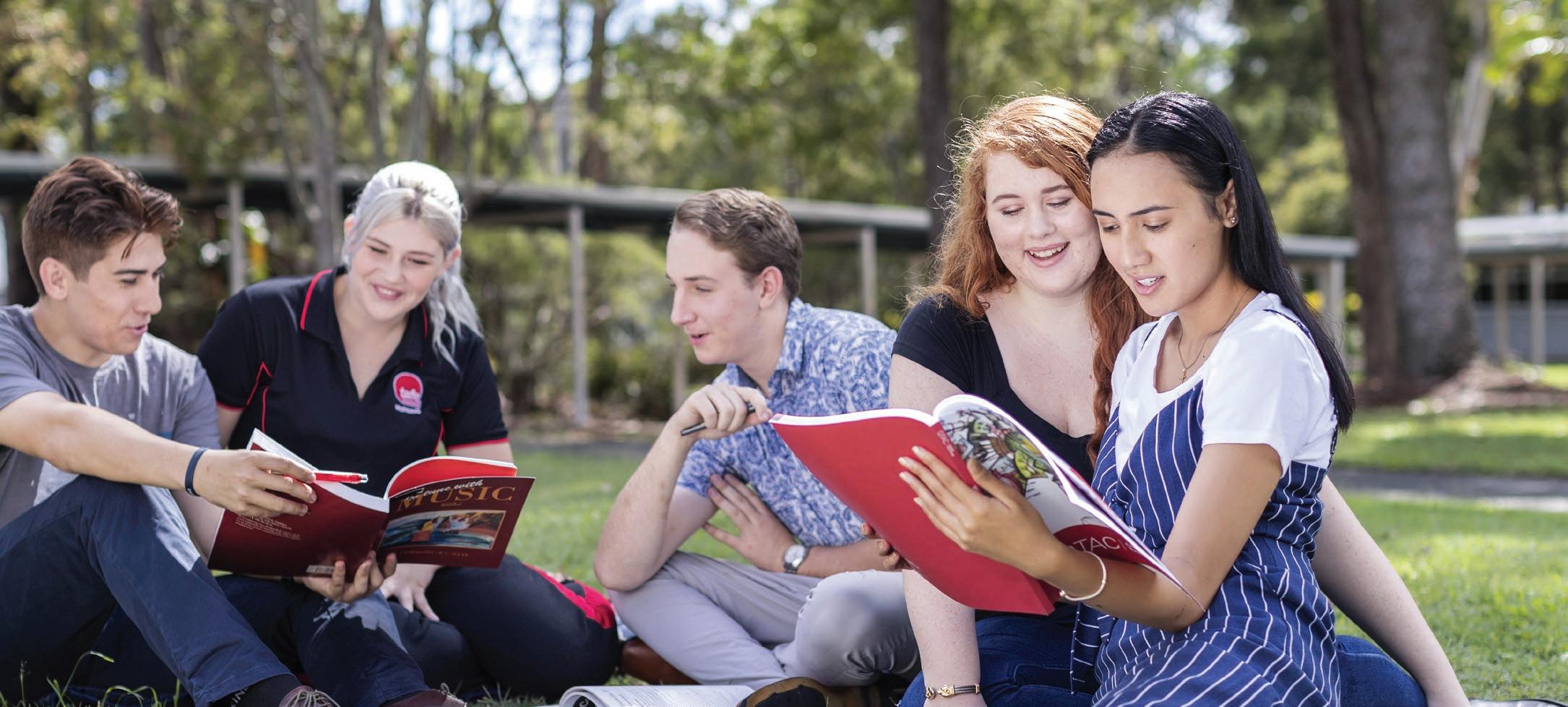
ATAR and QCE pathway
CHOOSE:
6 general subjects OR 4 general subjects + 2 applied subjects OR A completed certificate III or higher
Social and Community Studies
English
General Mathematics
Business
Biology
Health
Mathematical Methods
Psychology
ATAR AND QCE PATHWAY
QCE AND/OR VOCATIONAL PATHWAY
QCE AND/OR VOCATIONAL PATHWAY REQUIRED
APPLIED SUBJECT
With plenty of flexible study options available, please contact us to discuss the best option for you.
(07) 3826 8407 tafeqld.edu.au/seniorcollege
Bring this page to your Senior College interview to choose your pathway.
QCE and/or vocational pathway
CHOOSE:
5 QCAA subjects + 1 vocational certificate OR 6 QCAA subjects
Social and Community Studies
Essential English
Essential Mathematics
Business Studies
Information and Communication
Technology
Visual Arts in Practice
Drama in Practice
Music in Practice
Aquatic Practices
Science in Practice
Vocational certificate*
Please specify course name here
Please note that students who wish to apply for an alternative university ranking must complete a certificate III or higher over the course of their studies.
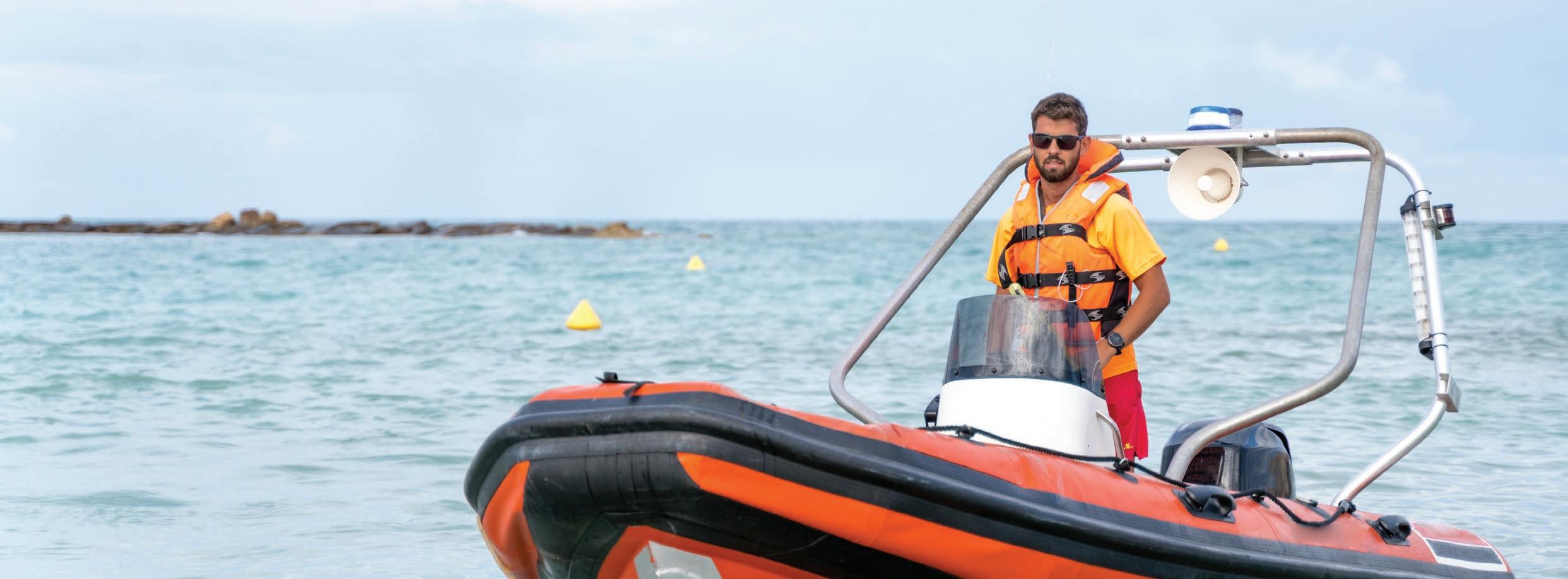
Kick-start your career in the maritime industry with this entry-level qualification.
This course will give you the entry-level skills required to start your career in many roles, such as coxswain grade 1, linesperson or deckhand. It can also be used to complement your trade skills (boat builder, welder, electrician, plumber, diesel mechanic, engineer) to expand your career opportunities in the marine sector.
According to the Australian Government’s Job Outlook service, the marine transport sector is expected to experience growth in the coming years. They anticipate around 2,000 job openings for marine transport professionals over the next five years, with around 30 per cent of these roles in Queensland.
You will gain practical experience operating and maintaining marine engines, navigating passages, and handling inboard and outboard motors. You’ll also learn vital skills in sea survival, safety procedures, and maritime regulations.
Upon completing this course, you’ll be well-positioned to apply for your Coxswain Grade 1 Near Coastal Certificate with the Australian Maritime Safety Authority (AMSA), opening the door to an exciting and rewarding career on the water.
Campus
Alexandra Hills
Study mode Face-to-face
Workload 1 full day per week
Duration 12 months
HLTAID011 Provide First Aid
MARB027 Perform basic servicing and maintenance of main propulsion unit and auxiliary systems
MARC037 Operate inboard and outboard motors
MARC038 Operate main propulsion unit and auxiliary systems
MARF027 Apply basic survival skills in the event of vessel abandonment
MARF028 Follow procedures to minimise and fight fires on board a vessel
MARF029 Meet work health and safety requirements
MARF030 Survive at sea using survival craft
MARH013 Plan and navigate a passage for a vessel up to 12 metres
MARI003 Comply with regulations to ensure safe operation of a vessel up to 12 metres
MARJ006 Follow environmental work practices
MARK007 Handle a vessel up to 12 metres
MARN008 Apply seamanship skills aboard a vessel up to 12 metres
Our flexible delivery options are designed to maximise learning outcomes while catering around the needs of our students’ high school studies.
You must be a Year 10, 11 or 12 student enrolled in a high school program.
Four points towards QCE on successful completion (Awarded).

If you’re a Year 10, 11 or 12 student you may be able to complete a TAFE Queensland qualification while you’re still at school.
Choose from a variety of certificate I to diploma courses from a range of study areas from construction to community services, hospitality to health care and everything in between.
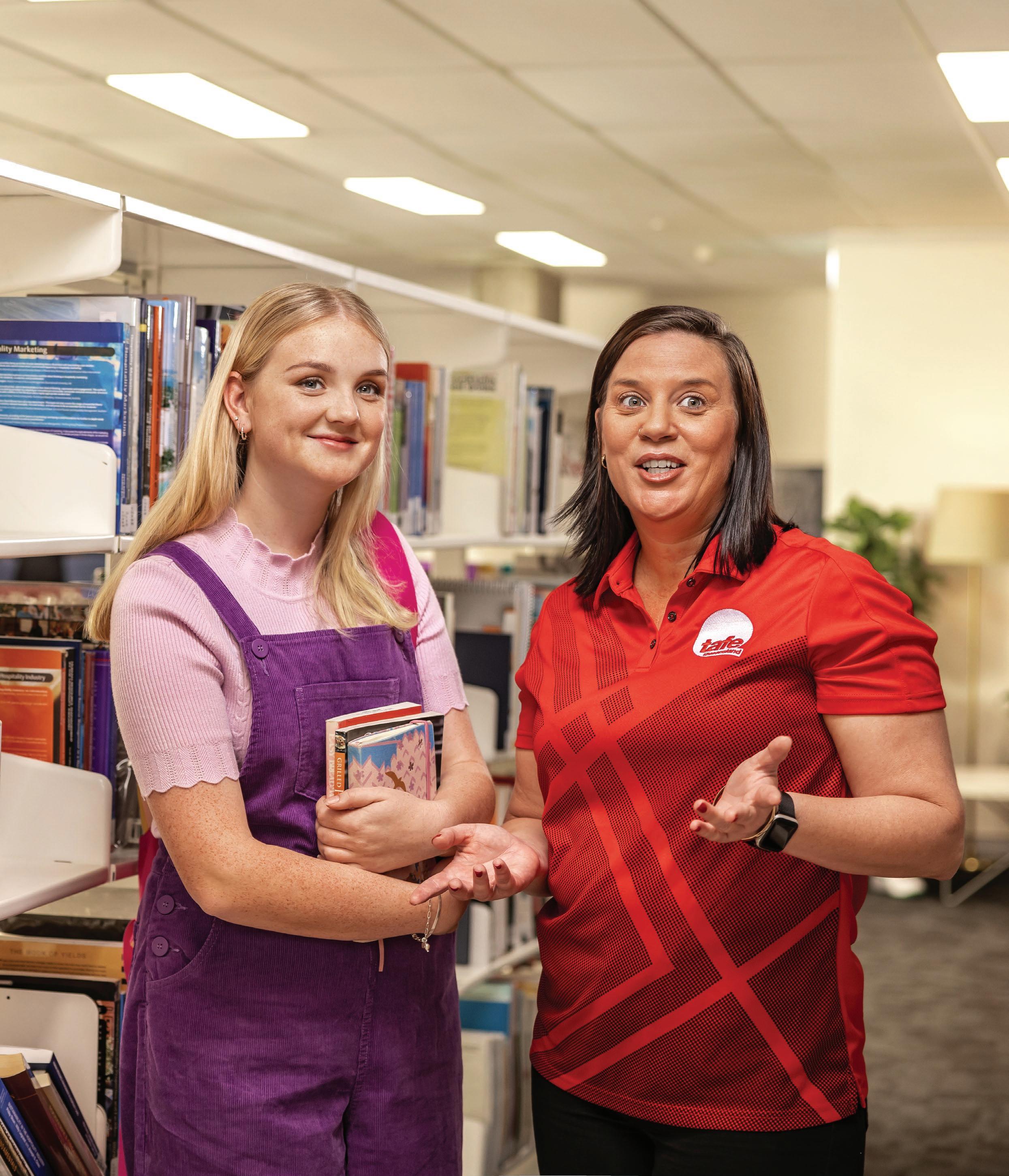
To submit an application for a TAFE at School course, visit tafeapply.com Applications open Monday 21 July 2025 and your application code is listed in the tables. You will also need your Learner Unique Identifier (LUI) and Unique Student Identifier (USI) numbers. If you don’t have a USI yet, head to usi.gov.au to get one.

No other provider can match TAFE Queensland for scale and location options. With more than 50 locations across the state, we have Queensland covered, no matter where you are. To view all of our locations, visit tafeqld.edu.au/locations.

Step into our purpose-built facilities, where you will learn hands-on using the same tools and equipment used in industry. Put your theory into practice straight away in our clinical labs, salons, training restaurants, creative spaces, and trades workshops. Develop your skills, ability, and confidence, and gain the practical experience you need to graduate job-ready.
For more information visit tafeqld.edu.au/facilities.
Our campuses are accessible by both private and public transport, with full details available on individual campus pages on our website at tafeqld.edu.au/locations.
If you are a full-time student, you may be eligible for a student discount on public transport. For more information or to plan your travel, call 13 12 30 or visit translink.com.au.
Acacia Ridge
247 Bradman Street, Acacia Ridge Qld 4110
Alexandra Hills Windemere Road, Alexandra Hills Qld 4161
Bracken Ridge
157 Norris Road, Bracken Ridge Qld 4017
Caboolture
Tallon Street, Caboolture Qld 4510
Eagle Farm
776 Kingsford Smith Drive, Eagle Farm Qld 4009
Acacia Ridge
Hills
Grovely Fitzsimmons Street, Keperra Qld 4054
Ipswich Corner Mary and Byrne Streets, Bundamba Qld 4304
Loganlea
50-68 Armstrong Road, Meadowbrook Qld 4131
Mt Gravatt 1030 Cavendish Road, Mt Gravatt Qld 4122
Redcliffe 64-68 Klingner Road, Redcliffe Qld 4020
City Drive,
Qld 4300 WesTEC
Nev Smith Drive, Springfield Qld 4300